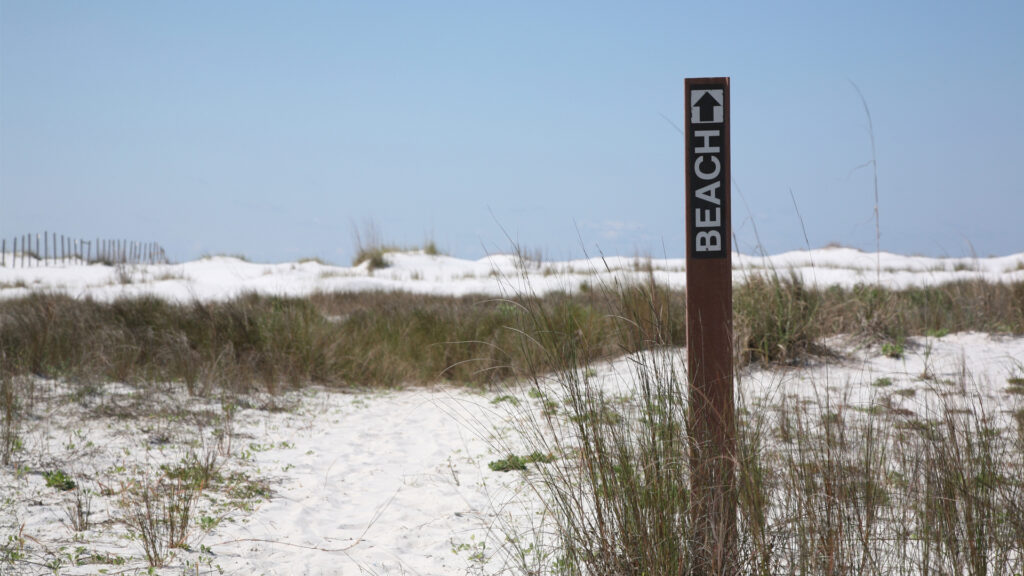By Emma Haydocy, Surfrider Foundation
For those who enjoy Florida’s beaches, understanding the risks of swimming from one day to another has been murky at best. It seems that everyone knows someone who has experienced some type of illness, skin irritation or worse, after an otherwise picturesque day visiting the beach in the Sunshine State.
These less-than-perfect beach days are due in large part to pollution from sewage, whether from sewage spills or overflows from failing or aging wastewater infrastructure, which contain bacteria, viruses and parasites that are harmful to human health. Compounding this problem is the lack of public information and inconsistent notification of crucial public health data generated by water quality testing in Florida’s coastal waters.
A law passed by the Florida Legislature in 2024 aimed to change that. State lawmakers passed House Bill 165, also known as the Safe Waterways Act, in March. Practically speaking, the bill would have required:

- The adoption and enforcement of rules to protect the health, safety and welfare of persons using beach waters and public bathing places
- The immediate issuance of public health advisories when a water body fails to meet water quality standards
- The closure of beaches that fail to meet standards if deemed necessary to protect public health, safety and welfare
- Conspicuous signage requirements for health advisories to be placed at beach access points and near affected waters
The bill was a true example of bipartisanship, with a coalition of Republican and Democratic leaders alike keen on addressing the public health deficiencies of the state’s beach water quality monitoring program. Spearheaded by state Reps. Peggy Gossett-Seidman, R-Highland Beach, and Lindsay Cross, D-St. Petersburg, and state Sens. Lori Berman, D-Lantana, and Ana Maria Rodriguez, R-Doral, the legislation passed unanimously in the Florida House and Senate. HB 165 is a testament of the importance of clean water and public health to lawmakers from the Panhandle to the Florida Keys, and everywhere in between.
Despite the unanimous bipartisan support from the Legislature, Gov. Ron DeSantis vetoed this legislation, citing overreach in authority granted to the Department of Health to close beaches. While this veto is a setback for clean water and public health, it raises the question of what can and should be done to ensure beachgoers in Florida are protected and informed when waterways are contaminated and polluted in the future.
For years, the Florida Healthy Beaches Program has seen anemic or lackluster funding from the state, and surfers, swimmers and ocean recreationists have been left largely in the dark regarding the safety of their local beach waters. Meanwhile, there has been notable confusion from the Department of Health about the timelines for retesting and public notification when bacteria levels exceed state standards, when and where signage should be placed at the beach, and who is responsible for maintaining signage during active health advisories.

For a state that relies heavily on clean water to drive its more than $122 billion tourism economy, ensuring that the public is informed of water quality impairments and safety issues is key to protecting its primary economic driver. Florida does not want the reputation of beaches where an entire family could catch a stomach bug from playing in the water.
To ensure Florida’s reputation for safe and beautiful beaches is maintained, and to streamline bureaucratic inefficiencies and inconsistencies, it is high time for Florida lawmakers to consider a comprehensive overhaul of the Florida Healthy Beaches Program, including transferring authority and oversight of the program to the Florida Department of Environmental Protection.
The chronic deficiencies of the Florida Healthy Beaches Program under the authority of the Department of Health have put the public health of Florida beachgoers at risk of getting sick from contaminated beach waters for more than a decade. With this year’s clean water and public health bill vetoed, there is a new opportunity to reform our state’s water quality monitoring program and place it under the guardianship of the agency capable of overseeing it in 2025.
This is a legislative fix worth fighting for, and one that Surfrider looks forward to championing in Tallahassee.
Emma Haydocy is Florida policy manager of the Surfrider Foundation, a nonprofit environmental organization. This opinion piece was originally published by the Sun Sentinel, which is a media partner of The Invading Sea.
If you are interested in submitting an opinion piece to The Invading Sea, email Editor Nathan Crabbe at ncrabbe@fau.edu. Sign up for The Invading Sea newsletter by visiting here.




Great article and why we need a fundamental right to clean water in our state constitution.
Please go to our website FloridaRighttoCleanWater.org and help collect petitions. We need one million.
Great article. Sharing it. My question is this. What agency will provide the highest level of scrutiny and accountability? As an appointed board, the DEP is very influenced by the agenda of whatever administration is in office. I will be ETERNALLY grateful to the courageous whistleblower that outed the actions of our governor and his cabinet. I have hope for that agency, but as we all have seen, he lost his job for alerting the people of this state.
At what point in public health mismanagement does oversight by federal or other agencies take place? Is the body count high enough yet? Asking for future generations, current residents, and the viability of our tourist industry. We are not safe…coastal or springs.